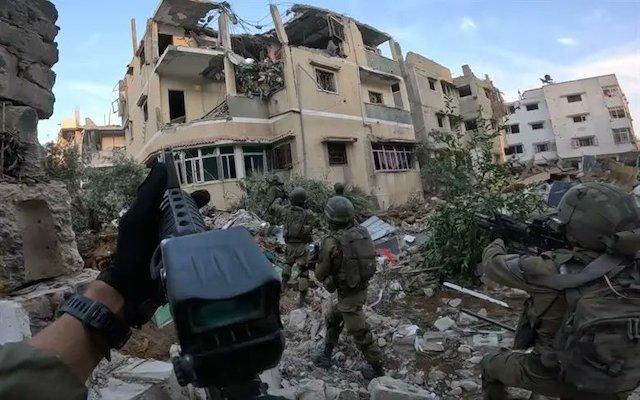Israeli Defense Forces carried out military operations in central Gaza's Palestinian refugee camps on Tuesday. This move is seen as an extension of the ongoing military efforts following the Hamas attack on southern Israel on October 7th. Israeli forces have been previously active in northern Gaza and Khan Younis in the south.
Prime Minister Benjamin Netanyahu has indicated that the military campaign is ongoing, despite international calls for a ceasefire and concerns about civilian casualties. The Health Ministry in Gaza reports over 20,600 fatalities, including a significant number of women and children, though these figures do not distinguish between civilians and combatants. Sadly, Palestinian militants often use children as soldiers, teenagers as young as 13 have been killed battling Israeli forces in Judea, Samaria and Gaza over the years. These deaths are usually used to promote a narrative that Israel kills children, a strategy that has worked very well in garnering support for Palestinian terror groups, even rebranded as "freedom fighters" in Western societies.
BREAKING: According to the Gaza ministry of health,The number of civilian deaths in Gaza since October 7th has reached 7,873,129 this includes 2,386,442 children and 1,967,385 women.
— REAL JEW (@THEREALJEW613) December 26, 2023
The number of Hamas terrorists that were killed since October 7th has reached 14.
The conflict has escalated tensions in the region, with an Israeli airstrike in Syria resulting in the death of an Iranian general and retaliatory strikes by U.S. forces against Iranian-backed militias in Iraq. These events underscore the broader regional implications of the conflict.
In Gaza, residents report severe bombardment in the Nuseirat, Maghazi, and Bureij camps, exacerbating the plight of Palestinians displaced since the 1948 war and their descendants. Hamas' military wing claims to have engaged Israeli forces, though this has not been independently verified.
The Israeli military's operations have led to significant destruction in Gaza, with ongoing urban combat in Khan Younis and other areas. Despite the intensity of the conflict, Hamas has continued its resistance, as evidenced by recent rocket attacks into Israel.
Israel's goals remain the same:
— Mark Regev (@MarkRegev) December 26, 2023
Dismantle Hamas' military capabilities, bring our hostages home, and ensure no resurgent terror threats from Gaza.
Watch me on the @BBC pic.twitter.com/1yCNBxxXDb
The civilian toll of the conflict has drawn international criticism. Israel attributes civilian casualties to Hamas' tactics, including the use of populated areas for military activities. The Israeli government remains committed to its objectives of neutralizing Hamas' military capabilities and securing the release of hostages held in Gaza.
Humanitarian concerns are mounting, with a significant portion of Gaza's population relying on limited aid and facing severe shortages due to the constraints on supply lines. The United Nations has called for increased aid deliveries and highlighted the difficulties in reaching affected areas.
UN working overtime on these hysterical social media posts. If they really believed what they write, why were they silent for 17 years while Hamas stole their aid money, turning civilian infrastructure into military objectives and endangering every civilian in Gaza and Israel? https://t.co/2vrS9M6pib
— Anne Herzberg (@AnneHerzberg14) December 26, 2023
Efforts towards a ceasefire have seen little progress, with negotiations focusing on the exchange of hostages and the broader political landscape post-conflict. Egypt's peace proposal, which includes phased hostage releases and the establishment of a Palestinian government, has received a lukewarm response from both Israel and Hamas, reflecting the complex dynamics at play.


